
Exposé Online
What's old
Exposé print issues (1993-2011)
- 1 (October 1993)
- 2 (February 1994)
- 3 (May 1994)
- 4 (August 1994)
- 5 (October 1994)
- 6 (March 1995)
- 7 (July 1995)
- 8 (November 1995)
- 9 (March 1996)
- 10 (August 1996)
- 11 (February 1997)
- 12 (May 1997)
- 13 (October 1997)
- 14 (February 1998)
- 15 (July 1998)
- 16 (January 1999)
- 17 (April 1999)
- 18 (November 1999)
- 19 (May 2000)
- 20 (October 2000)
- 21 (March 2001)
- 22 (July 2001)
- 23 (December 2001)
- 24 (April 2002)
- 25 (September 2002)
- 26 (February 2003)
- 27 (August 2003)
- 28 (December 2003)
- 29 (April 2004)
- 30 (September 2004)
- 31 (March 2005)
- 32 (September 2005)
- 33 (May 2006)
- 34 (March 2007)
- 35 (January 2008)
- 36 (October 2008)
- 37 (July 2009)
- 38 (July 2010)
- 39 (Summer 2011)
Features
Taking Your Mind off Nietzsche —
The Virgil Moorefield Interview

Composer Virgil Moorefield, drummer and one-time guitarist with Glenn Branca, has recently released his first CD with his nine-piece ensemble on Cuneiform, titled Distractions on the Way to the King's Party (see our review in Exposé #3). The ensemble has been gigging regularly in the New York area since their formation in 1992, playing venues such as The Kitchen, Roulette, and The Knitting Factory. Moorefield has also been involved with numerous other concurrent projects. Exposé caught up with Virgil while he was juggling various projects, and he was kind enough to spare a few moments out of his busy schedule with us.
by Peter Thelen, Published 1994-08-01
So what have you been up to since completing Distractions?
I just recently finished scoring Theodora Skipitares' "Under the Knife," a theater/multimedia work which is about the history of medicine. I wrote for string quartet, bassoon, electric guitar, and synthesizer.
Sounds pretty interesting, just judging from the instrumentation. How long did it take?
Too long! I worked on the project night and day for six manic weeks, and everything got done at the very last minute. I was a visiting artist at the University of Iowa. The show opened there in November, with three overlapping performances per night, Disneyland-style. Essentially we took over the entire theatre building, occupying two theatres, a café, the boiler room, and various lobbies, staircases, and halls. The audience was led through various tableaux involving elaborate sets, animated puppets of all sizes, and of course lighting and LOTS of speakers and tape decks, as well as live musicians. Just getting the musicians from one spot to another in time was a logistical challenge.
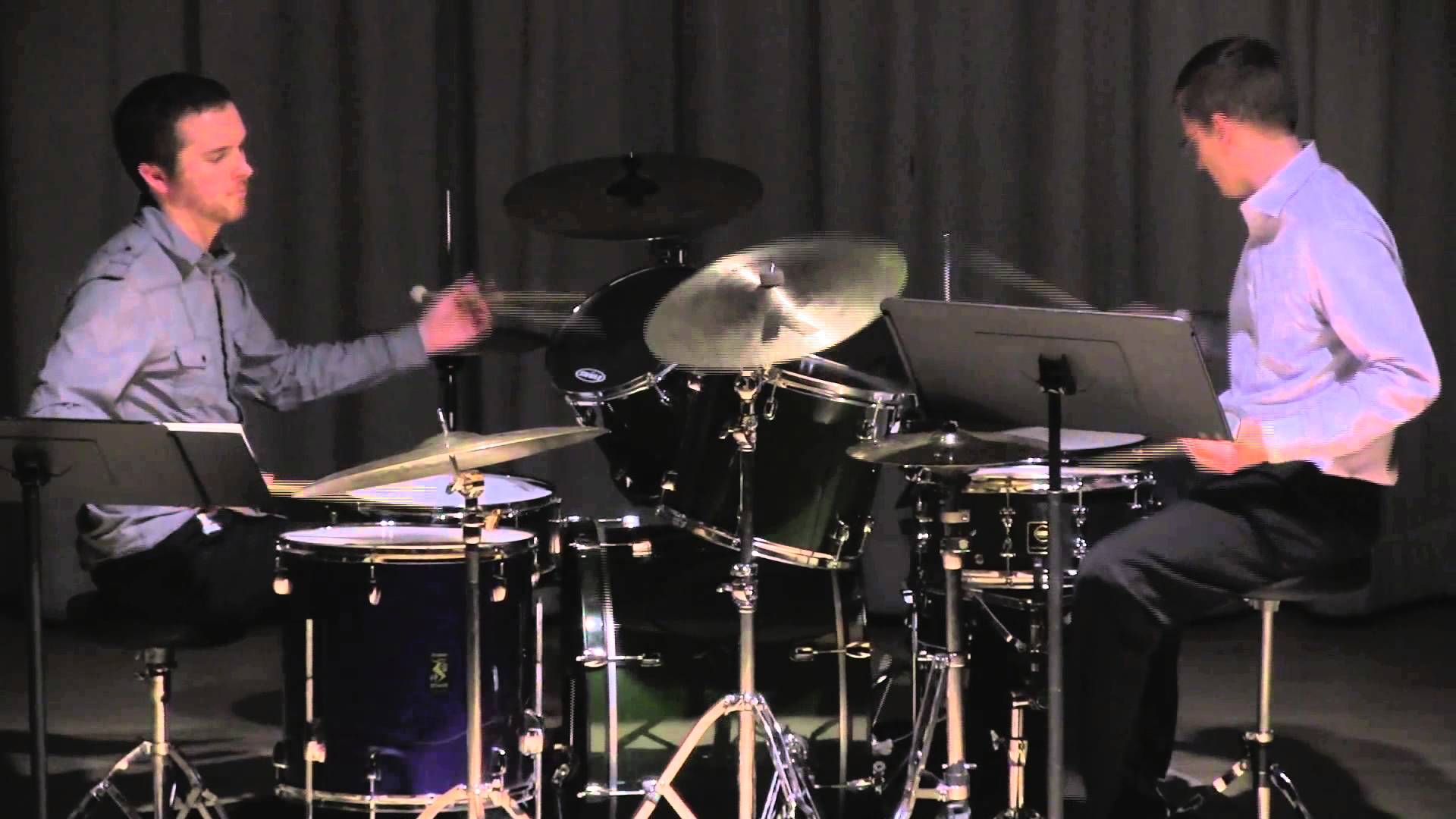 So what's next?
So what's next?
I've started writing material for the next album, which is tentatively scheduled for release on Cuneiform in '96, and we're hoping to tour Europe with the Distractions ensemble this fall. Also, I recently premiered a piece at CB's 313 I wrote for Carbon drummer Joe Trump and myself. It's called "Siamese Kits, Joined at the Kick," and it's a study in rhythmic dissonance using prime numbers. The drummers share one kit in a rather unusual way...
How will that work ? Won't two drummers on the same kit be getting in each other's way?
Not at all. We each take one side (head) of the kick drum, attach a pedal to it, and tilt one of the rack toms toward ourselves. We sit across from each other, and adding some other items we each have a full kit... except for the kick which is shared, hence the title. The physical proximity makes some pretty amazing things possible. We played rounds of eleven against thirteen, even seventeen against nineteen, shifting rapidly.
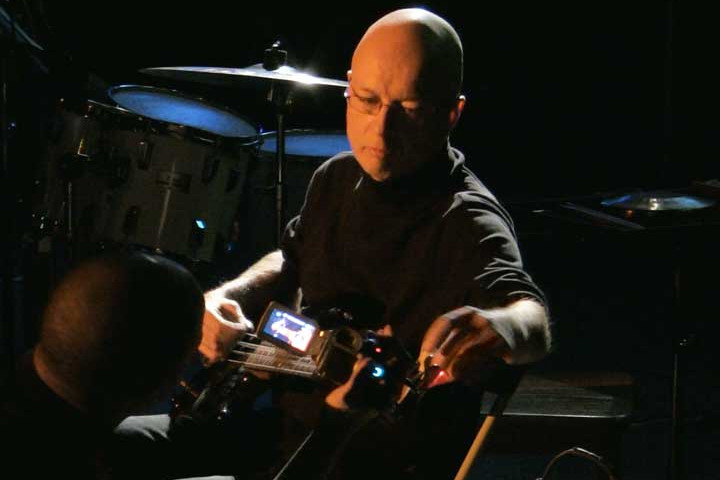 Are you still working with Glenn Branca? By chance I picked up a copy of his Symphony #6 "Devil Choirs at the Gates of Heaven" a few weeks back when I was in Berkeley. Amazing stuff. Doesn't he have a jazzy side as well?
Are you still working with Glenn Branca? By chance I picked up a copy of his Symphony #6 "Devil Choirs at the Gates of Heaven" a few weeks back when I was in Berkeley. Amazing stuff. Doesn't he have a jazzy side as well?
I think it's safe to say there's not a shred of jazz in Branca's work. I toured on guitar with Symphony #6, but didn't record with him because I was offered a project with Swans (Bill Laswell producing) at the same time. I play drums with Branca now. We did a European tour in February, and we're going back a couple of times in the summer and fall.
Was this challenging music to perform?
Yes, especially since I'm not really a guitarist and was surrounded by some pretty amazing players. But Glenn uses special tunings, so that leveled the field somewhat-- kinda hard to make those Van Halen licks sparkle when all your strings are tuned to the same note! (laughs) I'm a lot more comfortable now on drums, playing what comes natural. Now the main challenge is physical endurance.
You play only drums on Distractions. What about your earlier albums? Are they still in print? How do they stack up to Distractions?
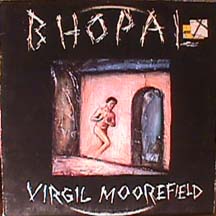 Both Transformations and Bhopal are out of print. Transformations was an early attempt at composing for large ensemble, and was my first recording (1983). Bhopal (1986) was an attempt at musical theatre which didn't work very well, although I'd say it was an interesting attempt at making sense of a great tragedy. Those were the works of my twenties. Distractions is in a different class, the pieces are much more developed and challenging.
Both Transformations and Bhopal are out of print. Transformations was an early attempt at composing for large ensemble, and was my first recording (1983). Bhopal (1986) was an attempt at musical theatre which didn't work very well, although I'd say it was an interesting attempt at making sense of a great tragedy. Those were the works of my twenties. Distractions is in a different class, the pieces are much more developed and challenging.
What else did you do in the eighties?
Aside from the albums and tours I've mentioned, I wrote quite a few theater, dance, and video soundscores, especially for Theodora Skipitares and Joseph Nechvatal, the video artist and painter. I also played drums in hardcore rock bands like Damage and K-Martians. And I ran a recording studio in the East Village. There was this scrappy old lady named Regina who lived above the studio and would phone in her opinion of whatever we were recording.
Let's move back to the present. Listening to Distractions, I was wondering how most of your compositions come about. I noticed especially that in compositions like "Vitus Dance" or "Untitled,” a lot of attention is given to the three guitar parts that lurk below the surface.
The album was written over a period of four years. The pieces simply wrote themselves over time. Often I would come up with the bass line first, although sometimes entire fragments would appear without a clear context. That was always the challenge, what to do structurally. It's easy for me to come up with a cool riff, but the transitions, making a whole piece cohere, can be hell. The older pieces sometimes use minimalist techniques, but by the time a recent composition like "Noise Is..." comes along, I hear myself working more with possibilities of form and structure, seeking a broader palette, as well as more expression from each individual instrument.
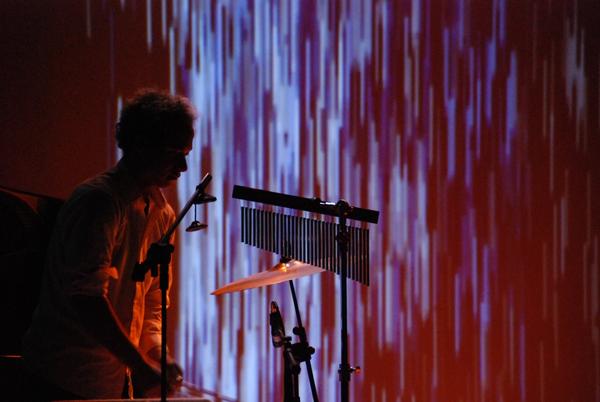 You write out all the arrangements. How is this accomplished? Do you do everything by hand?
You write out all the arrangements. How is this accomplished? Do you do everything by hand?
I use a computer. The transposition chores alone would be just too much of a pain otherwise. The CD was written using "Notator" on the Atari. I have since sold it because the platform is obsolete, I now use Cubase Audio and Finale for the Mac. However I suspect that the architecture of any sequencer influences how one builds a composition, so Finale is interesting because it's really just a notation tool/transcription program. Seems to make one think more...although Cubase is my choice when there's MIDI involved.
Has all your music to date has been instrumental ? Have you considered using vocals or voices as part of your palette? What about lyrics?
Both Bhopal and the work for Skipitares feature vocals. I find that vocals distract from the music itself- as soon as there are lyrics, one focuses on them, often to the detriment of the instrumental lines, which become secondary. Also, I don't write lyrics. It's just not something I'm interested in. When I set someone else's lyrics, it sets the agenda in a way I often find limiting.
Certain parts of Distractions remind me of some of Fripp's League of Crafty Guitarists, or maybe Frederic L'epee/Philharmonie. Are either of these guys an influence, or is there a common influence of all that I'm not aware of? (I don't follow Fripp that closely anymore)
Frederic L. I've never heard of. Fripp is an influence if we consider King Crimson's original incarnation: they were my first exposure to odd time, orchestral guitars, malevolent saxes dueling with distorted electric guitars playing twisted little melodic cells. Also Fripp was the first to use indefinite sustain, I think (Frippertronics). The League is a footnote, pretty arrangements but not of the caliber of early Crimson.
Was Zappa an influence as well?
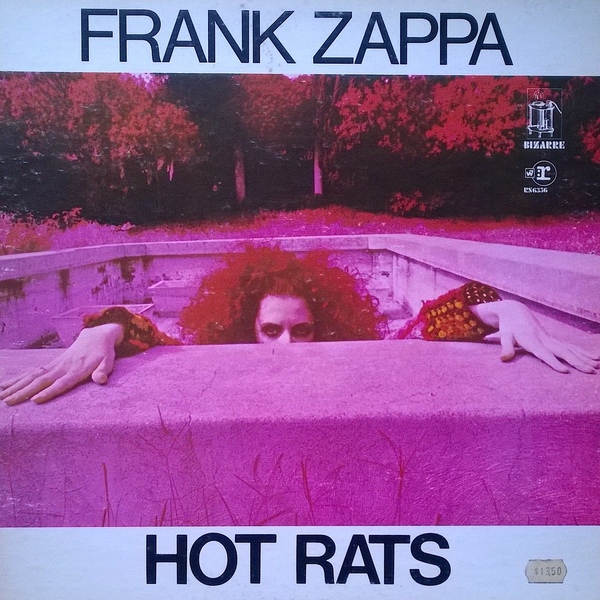 Hot Rats is brilliant. "Peaches en Regalia,” for example, is a level of inspiration and affect that I aspire to. Uncle Meat is another important album. Can there ever be another "King Kong"? I cried when I heard Zappa died. I had always just assumed I would meet him one day. Ever read his book? Did he have the music business figured out, or what?
Hot Rats is brilliant. "Peaches en Regalia,” for example, is a level of inspiration and affect that I aspire to. Uncle Meat is another important album. Can there ever be another "King Kong"? I cried when I heard Zappa died. I had always just assumed I would meet him one day. Ever read his book? Did he have the music business figured out, or what?
Just finished the book a few weeks ago. The chapter "Drool Brittania" is one of the funniest things I've ever read. The sad thing is it really happened. How did you become interested in music in the first place, and in particular, what led you to the drums?
I have very early memories of attending orchestral concerts when we lived in Rome, Italy. I was about four years old at the time, and became utterly fascinated with Peter and the Wolf, b/w The Young Person's Guide to the Orchestra. For my fifth birthday I got a bright red miniature drum set; by age twelve I was the drummer boy for a Swiss marching band near Zurich, Switzerland. I had this really strict, legally blind teacher who taught me the ropes by sheer terror - wrong notes were punished by a whack on the head with a drumstick. Then came adolescence and with it rebellion, and I got involved with local rock bands. But by the time I was sixteen I had been introduced to free jazz, and that really changed my perspective. Once I heard Steve Reich I wanted to move to New York, although I was not yet fully committed to a career in music. So I went to Columbia and got a couple of degrees in comparative literature and philosophy; if there's anything that'll take your mind off Nietzsche, it's a good wail on the kit. Basically the drums have always been a form of emotional release and expression for me, so I'm very attached to playing.
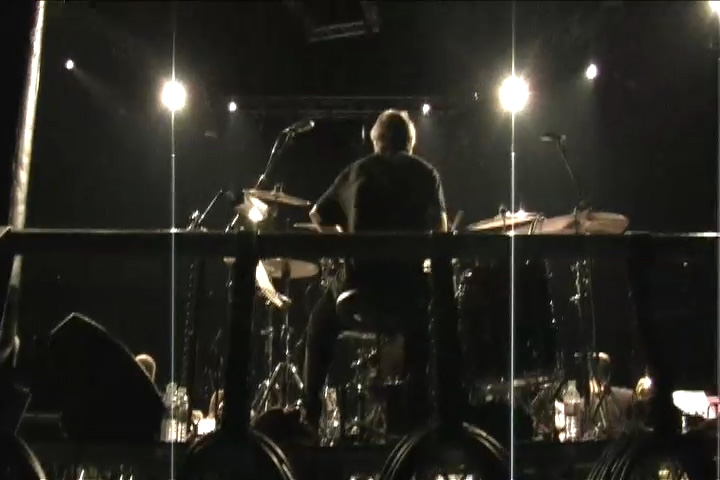 Are there any other signposts and turning points in your musical and compositional development that you'd like to mention?
Are there any other signposts and turning points in your musical and compositional development that you'd like to mention?
Flashback to 1978: I'm at Carnegie Hall, Philip Glass is performing the rocket ship music from Einstein on the Beach with the Gregg Smith singers. That was a defining moment for me: hearing that stuff made me say "This is IT. This is what I want to do with my life." My early work is very minimalist-influenced. I tended to gravitate toward it because rock drumming, which is where my roots are, is very similar in its aesthetic. Steve Reich was a jazz drummer before he started composing. Being around other New York composers has also been an influence. I've learned a lot from my colleagues: Ben Neill, Elliott Sharp, Kurt Hoffman, Nick Didkovsky, and of course Glenn Branca. One thing that tends to confuse people is that I like music of all stripes. My friends at Juilliard can't fathom rock, while most people in the Branca ensemble don't like jazz. John Zorn has said that all musics are equal. I think I could go along with that, if what we're talking about is erasing the distinction between "art" and "popular" music. Though I must say I draw the line at Michael Bolton.
What sort of music are you listening to these days, when you're not busy making your own?
Lots of different stuff, especially classical. Mozart's Don Giovanni (now THAT rocks, except for the tenor who keeps moralizing all over the place - but dig the Stone Guest), Rameau's Dardanus, Purcell's Dido and Aeneas, Mahler's Ninth; of this century, I'm into Giacinto Scelsi's orchestral work, Berg, Lutoslawski, Schnittke... but I've also been listening to Nine Inch Nails, Primus, Prong... Aphex Twin, Orb...
Any observations you'd like to make about the present state of things - musically?
As far as the state of things musical goes, I'm optimistic, despite the fact that our government spends more on the armed forces marching bands than it does on the entire National Endowment for the Arts. There are lots of good units out there which deserve to be heard (Band of Weeds, B.O.X.) but are not given their due; they go on with or without support from the government and/or record companies (mostly without). I think the main problem we face is the distribution system. The reason David Geffen sells more records than Steve Feigenbaum is that he and a few other fat cats control the distribution pipeline. It is easier for them to sell the kids in Peoria on Morrissey than on a combination of, say, all the bands on Knitting Factory Works. Joe Normal, who owns a Musicland franchise in Iowa City, has a mortgage to pay, so he plays along: he puts the Mariah Carey out front because he knows it will sell with less effort. After all, the record company just launched a major campaign which will tell everyone not only what to listen to, but more importantly suggest to insecure adolescents what to wear, etc.
Agreed. I think most of us on the rock fringes have totally given up on everything but the independent mail-order distribution track.
Maybe it's naive, but I have high hopes for the information superhighway. I mean, you and I are talking, right? If the record companies were to be rendered obsolete by new technologies such as high-speed data buses which could deliver custom CDs right into the microprocessor of your choice, well then there may be hope yet.
OK, Virgil. Thanks for taking the time and I'll be looking forward to seeing you on a west-coast Cuneiform tour.
Absolutely. Now, about that rider...
Filed under: Interviews, Issue 4
Related artist(s): Virgil Moorefield
More info
http://www.virgilmoorefield.com
What's new
These are the most recent changes made to artists, releases, and articles.
- Release: Greg Segal - Maintain!
Updated 2026-02-24 00:38:03 - Review: Il Segno del Comando - Sublimazione - Live
Published 2026-02-24 - Review: Nektar - Mission to Mars & Fortyfied
Published 2026-02-23 - Review: Jaime Rosas - Tres Piezas de Rock Progresivo
Published 2026-02-22 - Release: Kevin Kastning & Bruno Råberg - Across Tall Rain
Updated 2026-02-21 00:42:08 - Review: Gary Husband - Postcards from the Past
Published 2026-02-21 - Release: Daniel Crommie - Februa
Updated 2026-02-20 14:23:17 - Artist: Daniel Crommie
Updated 2026-02-20 14:22:43 - Release: b.mez - Under Circuitous Skies
Updated 2026-02-20 14:18:27 - Artist: b.mez
Updated 2026-02-20 14:17:34 - Release: Il Segno del Comando - Sublimazione - Live
Updated 2026-02-20 11:36:17 - Review: Maledictis - Echoes of Conscience
Published 2026-02-20 - Release: Lorenzo Montanà - Velan
Updated 2026-02-19 23:52:26 - Release: Erik Wøllo - Snow Tides
Updated 2026-02-19 23:45:00 - Release: The Forever Moment - A City Singing
Updated 2026-02-19 19:57:54 - Release: The Forever Moment - Here to Stay
Updated 2026-02-19 19:56:27 - Release: Hyper Gal - Our Hyper
Updated 2026-02-19 19:52:48 - Release: Mathieu Torres - Desconegut
Updated 2026-02-19 19:51:59 - Release: Tanya Tagaq - Saputjiji
Updated 2026-02-19 19:50:54
